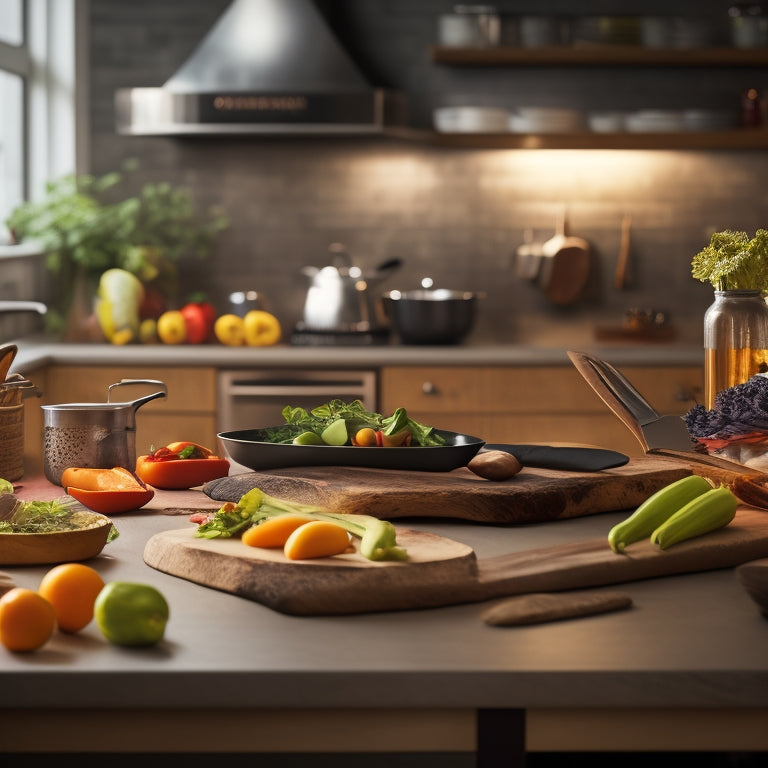
3 Essential Cooking Skills for Kitchen Confidence
Share
You're already a skilled cook, but refining three essential skills will take your kitchen confidence to new heights. Mastering knife work lays the foundation for efficient chopping, slicing, and mincing. Cooking with flavor and ease means balancing ingredients, mastering spice blends, and slow-cooking to bring out natural flavors. Finally, planning like a pro involves setting meal goals, minimizing waste, and making a grocery list. By honing these skills, you'll transform into a confident kitchen whiz, unlocking your creativity and impressing with every dish. As you continue on this culinary journey, the possibilities will only continue to unfold.
Key Takeaways
• Mastering essential knife skills is crucial for kitchen confidence, enabling efficient chopping, slicing, and mincing with precision and safety.
• Developing flavor-enhancing techniques, such as spice blending and slow cooking, brings out the natural flavors of ingredients effortlessly.
• Meal planning like a pro saves time, reduces food waste, and stays within budget, while allowing for flexibility and adjustments as needed.
• Prioritizing knife safety and proper cutting techniques is vital for avoiding accidents and ensuring a smooth cooking experience.
• Practicing basic cuts, such as chopping, slicing, and dicing, and progressing to complex cuts like julienning and mincing, builds confidence and skill in the kitchen.
Mastering Essential Knife Skills
Developing proficiency with a chef's knife is a fundamental step in building a strong foundation in cooking, as it enables you to efficiently chop, slice, and mince ingredients with precision and confidence.
To master essential knife skills, you'll need to focus on two critical areas: Knife Safety and Cutting Techniques.
First, prioritize Knife Safety. Always cut on a stable, flat surface, and guarantee your knife is sharp. A dull knife is more likely to slip and cause accidents. Keep your fingers curled under and out of the way of the blade, and never cut towards your body. When handling the knife, maintain a firm grip, but avoid squeezing it too tightly.
Next, focus on developing proper Cutting Techniques. Practice basic cuts, such as chopping, slicing, and dicing. Learn to hold the knife at a 45-degree angle and apply gentle pressure. As you gain confidence, experiment with more complex cuts, like julienning and mincing.
Remember to keep your movements smooth and controlled, and never rush through a cut. With practice and patience, you'll become proficient in no time, and open the door to cooking with ease and liberation.
Cooking With Flavor and Ease
With your knife skills sharp, you're now ready to reveal the full flavor potential of your ingredients, and that's where the art of cooking really begins.
You'll discover that cooking with flavor and ease is all about understanding how to balance and combine ingredients to create harmonious dishes.
Spice blending is an essential skill to master, as it allows you to add depth and complexity to your recipes. Learn to blend spices that complement each other, and don't be afraid to experiment with new combinations.
Slow cooking is another technique that will become your best friend, as it allows you to coax out the natural flavors of your ingredients without much effort. By cooking low and slow, you'll be able to create rich, comforting dishes that will become staples in your kitchen.
With these skills under your belt, you'll be able to cook with confidence and creativity, whipping up delicious meals that will impress anyone.
Meal Planning Like a Pro
You'll take your cooking skills to the next level by mastering the art of meal planning, which is all about intention, organization, and flexibility. By planning your meals, you'll save time, reduce food waste, and stay within your budget.
Here are some pro tips to get you started:
-
Set your intentions: Decide on your meal goals for the week, considering dietary restrictions, allergies, and preferences.
-
Plan your meals: Choose recipes that use similar ingredients to minimize waste and make grocery shopping more efficient.
-
Make a grocery list: Stick to your list when you're at the store to avoid impulse buys and stay on budget.
- Be flexible: Life can be unpredictable, so don't be too hard on yourself if your plans change. Instead, adjust your meals and grocery list accordingly.
Frequently Asked Questions
How Do I Organize My Kitchen Utensils and Tools for Easy Access?
You tame countertop clutter by assigning a home for each utensil, using drawer dividers to separate items, and storing frequently used tools in easy-to-reach spots, freeing you to focus on cooking with confidence.
What Are the Best Cookware Materials for Non-Stick and Durability?
You'll want cookware with ceramic coatings for non-stick ease and durability. Look for materials that guarantee excellent heat distribution, like hard-anodized aluminum or stainless steel, to prevent hotspots and make cooking a breeze.
Can I Use a Slow Cooker for Healthy Meal Prep and Planning?
You can totally use a slow cooker for healthy meal prep and planning! Simply portion out ingredients, slow cook, and refrigerate or freeze for later - it's a game-changer for meal portioning and stress-free meal prep.
How Often Should I Clean and Maintain My Oven for Optimal Performance?
You should clean your oven every 1-3 months, depending on usage. Check your manual for self-cleaning modes, and calibrate your oven regularly to guarantee peak performance and even heating.
What Are Some Pantry Staples I Should Always Have on Hand?
You should always stock your pantry with staples like olive oil, salt, and spices to perfect Flavor Profiles and Spice Ratios, revealing endless recipe possibilities and elevating your dishes to new heights.